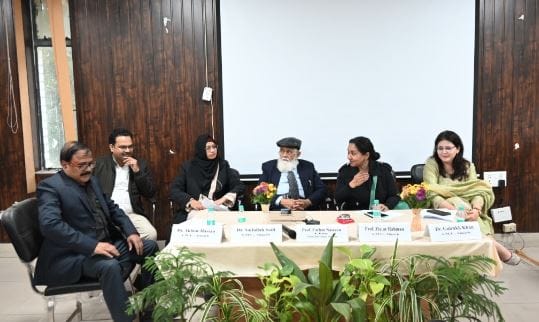Last Updated on February 7, 2025 9:10 pm by INDIAN AWAAZ

AMN / Aligarh
The two-day international conference on “Legacy of Central Asia and India: History, Polity, Society, and Culture in Global Perspectives”, under the aegis of the Centre of Advanced Study, Department of History, Aligarh Muslim University (AMU) concluded with discussions on a wide variety of topics such as Central Asian influence on Indian society and culture, historical and diplomatic ties, Indo-Turkic cultures, Russian route to India, medieval Persian texts, sovereignty and traditions, art, architecture, literature, economic, political, and strategic dimensions of India-Central Asian relations, intellectual legacy and contemporary politics, and India’s strategic engagements in the region, among others.
Eminent scholars, historians, and academicians from various institutions discussed the deep-rooted historical, cultural, and political connections between Central Asia and India, in the international Conference on “Legacy of Central Asia & India: History, Polity, Society, and Culture in Global Perspectives”, organised by the Centre of Advanced Study, Department of History, Aligarh Muslim University (AMU).
The first session related to ‘historical and diplomatic ties’ was chaired by Prof. Ali Athar, in which Prof. Arshad Islam (Islamic University of Malaysia), Prof. Eugenia Vanina (Institute of Oriental Studies, Russia), Prof. Syed Jamaluddin (JMI, New Delhi), Prof. Farhat Nasreen (JMI, New Delhi) and Dr. Aijaz Ahmad (M.D. University Rohtak) presented their papers. These papers were related to Indo-Turkic cultures, Russian route to India, medieval Persian text Avimaaq i Mughal, folk tales in both these geographical regions and Baburnama.
Eight research papers related to the influences of Central Asia on Urdu, sovereignty and tradition, Tazkirat us Shoara of Daulat Shah, intellectual legacy, and contemporary politics were presented in the second session based on Central Asian influence on Indian Society and Culture.
Prof. Farhat Nasreen chaired the session wherein Prof. Ziaur Rahman (AMU), Dr. Shahbaz Azmi (JNU), Dr. Saifullah Saifi, Dr. Gulrukh Khan, Dr. Akhter Hassan (AMU), Dr. Shagufta Parveen, and Dr. Tarique Anwer (Mangalayatan University) shared their views.
In the technical session on art, architecture, and literature in Indo-Central Asian relations, eight presenters including Dr. Babita (Mangalayatan University), Dr. Mohammad Muneer Alam (Jammu University), Dr. Nazer Aziz Anjum, Dr. Suhaib Qayyoom, Ms. Aqsa and Ms. Mahenaz shared their ideas and findings on lexicography, Central Asian influences of medieval art, architecture, and cavalry, mannerism, historical significance of Tarikh i Rashidi. The session was chaired by Prof. Eugenia Vanina.
The fourth session related to the economic, political, and strategic dimensions of India-Central Asian relations and chaired by Prof. Arshi Khan, featured presentations by Prof. Saifuddin (Delhi University), Dr. Nasir Raza Khan (JMI, New Delhi), Dr. Rahat Hasan (AMU), Dr. Mohd Ehtesamuddin and Dr. Nawaz Sharif (Dhanamanjuri University, Manipur). They discussed the dynamics of cultural transfer, look north policy, India’s strategic engagements in Afghanistan, Silk Road, and the Baburnama.
Different aspects of culinary dishes, agricultural production, taxation system, Central Asian migrants in Badaun, diplomatic relations, fashion of the royal harem, calligraphy, and life and conditions of women were discussed in the fifth academic session related to food, travel, and ethos shared between India and Central Asia.
The session chaired by Prof. Syed Jamaluddin, had presentations by Dr. Harish Kumar (Government College, Ujjain), Prof. Rukhsar Iftekhar (University of Punjab, Pakistan), Dr. Elif Gulbash (Istanbul University. Turkey), Ms. Asiya Nazir(CCAS, University of Kashmir), Dr. Fazeela, Dr. Farah Saif Abidin, Dr. Nafees, Dr. Ziyaul Haque, Dr. Zafer Minhaj, Mr. Aurgangzeb Khan and Ms. Darakshan Naz (AMU).
Cultural and linguistic exchanges between India and Central Asia was the theme of the last academic session chaired by Prof. Pervez Nazir.
Dr. Mohammad Ibrahim Wani, Dr. Mohammad Afzal Mir (Kashmir University Srinagar), Syed Saima Showkat (LPU, Punjab), Dr.Bilal Sheikh (Jammu and Kashmir Higher Education, Srinagar) and Dr. Ashaq Hussain (Jammu and Kashmir) presented papers on the aspects of Central Asian impacts of Kashmir, Afghan immigrants in Mughal India, medieval cities of Bukhara and Samarkand along with renewal and non-renewal energy potential of Central Asia.
In the valedictory session, Professor Hassan Imam, Chairperson and Coordinator, CAS, Department of History and Professor M. Waseem Raja, the convener extended thanks to the participants, invited speakers, University administration and committee members including every stakeholder for making the conference a success
